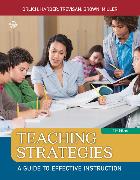TEACHING STRATEGIES: A GUIDE TO EFFECTIVE INSTRUCTION, now in its eleventh edition, gives you practical, applied help with commonly used classroom teaching strategies and tactics. Ideal if you are studying education or involved in a site-based teacher education program, the book focuses on topics such as lesson planning, questioning, and small-group and cooperative-learning strategies. The new edition maintains the book's solid coverage, while incorporating new and expanded material on technology integration planning, English Language Learner instruction, and proactive classroom management, as well as an up-to-date discussion of teaching students with disabilities and differentiated instruction. The text is available with the digital learning solution MindTap, which features an integrated e-portfolio, videos of classroom teaching situations, quizzes, professional resources, scenario activities, and other tools to help you succeed in the course and beyond.


